

Mass Deaths of Endangered Antelopes Alarm Scientists. The sudden deaths of tens of thousands of endangered antelopes in ex-Soviet Kazakhstan over the past two weeks have left scientists scrambling for answers and conservationists worried about the animal’s future.

Over 120,000 rare saiga antelopes — more than a third of the total global population — have been wiped out in a devastating blow that the United Nations Environment Program has called “catastrophic”. UN experts have said the mass deaths are down to “a combination of biological and environmental factors.” 10 Hunted Animals You Had No Idea About Scientists have struggled to put their finger on the exact nature of the disease that has felled entire herds, but say findings point towards an infectious disease caused by various bacteria. Any infections have likely been exacerbated by recent rains that have made the antelopes — 90 percent of which live on the steppes of Central Asian Kazakhstan — less able to cope with diseases.
Poached Rhinos Reach Record Levels - Decade to recover -
Can civilisation continue? An Earth system scientist explains. The Conversation organised a public question-and-answer session on Reddit in which James Dyke, a lecturer in Complex System Simulation, discussed planetary boundaries and whether global industrialised civilisation is headed for collapse.
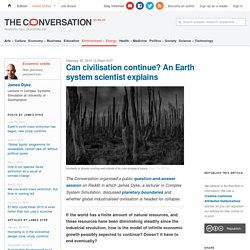
If the world has a finite amount of natural resources, and these resources have been diminishing steadily since the industrial revolution, how is the model of infinite economic growth possibly expected to continue? Doesn’t it have to end eventually? This is a good question, however I think it’s possibly something of a red herring. That is, we don’t have to worry too much about ultimate or absolute limits to growth. What we need to worry about is how we move towards such limits from where we are right now. We have an increasingly narrow space within which to operate, to organise ourselves on Earth.
Do you agree that it is already too late to prevent global catastrophe caused by global warming? No. Sometimes people talk about social transitions. Yes. Earth's sixth mass extinction has begun, new study confirms. We are currently witnessing the start of a mass extinction event the likes of which have not been seen on Earth for at least 65 million years.
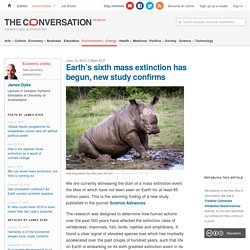
This is the alarming finding of a new study published in the journal Science Advances. The research was designed to determine how human actions over the past 500 years have affected the extinction rates of vertebrates: mammals, fish, birds, reptiles and amphibians. It found a clear signal of elevated species loss which has markedly accelerated over the past couple of hundred years, such that life on Earth is embarking on its sixth greatest extinction event in its 3.5 billion year history. This latest research was conducted by an international team lead by Gerardo Ceballos of the National Autonomous University of Mexico. Measuring extinction rates is notoriously hard. However, there is always the risk that such work overestimates modern extinction rates because they need to make a number of assumptions given the very limited data available.
Humanity is in the existential danger zone, study confirms. The Earth’s climate has always changed.
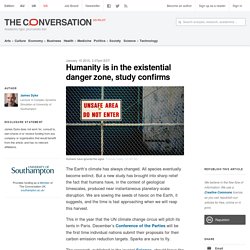
All species eventually become extinct. But a new study has brought into sharp relief the fact that humans have, in the context of geological timescales, produced near instantaneous planetary-scale disruption. We are sowing the seeds of havoc on the Earth, it suggests, and the time is fast approaching when we will reap this harvest. This in the year that the UN climate change circus will pitch its tents in Paris. December’s Conference of the Parties will be the first time individual nations submit their proposals for their carbon emission reduction targets. The research, published in the journal Science, should focus the minds of delegates and their nations as it lays out in authoritative fashion how far we are driving the climate and other vital Earth systems beyond any safe operating space. It argues climate change along with “biodiversity integrity” should be recognised as core elements of the Earth system. Click to enlarge Updated boundaries. Rivet%20Poppers.pdf.
Has the Earth's sixth mass extinction already arrived? Theconversation. Humans have caused a 10% reduction in the total numbers of land-based wild animal and plants over the past 500 years, according to a major new study.
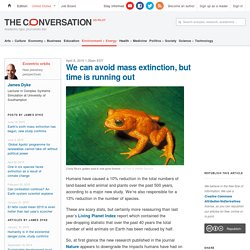
We’re also responsible for a 13% reduction in the number of species. These are scary stats, but certainly more reassuring than last year’s Living Planet Index report which contained the jaw-dropping statistic that over the past 40 years the total number of wild animals on Earth has been reduced by half. So, at first glance the new research published in the journal Nature appears to downgrade the impacts humans have had on other species. However, delving deeper into the article shows large regional differences and provides yet more evidence that we are on a collision course towards mass extinction by the end of this century.
Biodiversity is by its very nature difficult to measure. Cataloguing human impacts Click to enlarge. One in six species faces extinction as a result of climate change. The Earth is on course to lose up to one in six of all its species, if carbon emissions continue as they currently are.
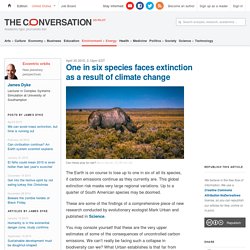
This global extinction risk masks very large regional variations. Up to a quarter of South American species may be doomed. Earth’s Sixth Mass Extinction Has Begun, New Study Confirms. We are currently witnessing the start of a mass extinction event the likes of which have not been seen on Earth for at least 65 million years.

This is the alarming finding of a new study published in the journal Science Advances. e1400253.full.pdf.